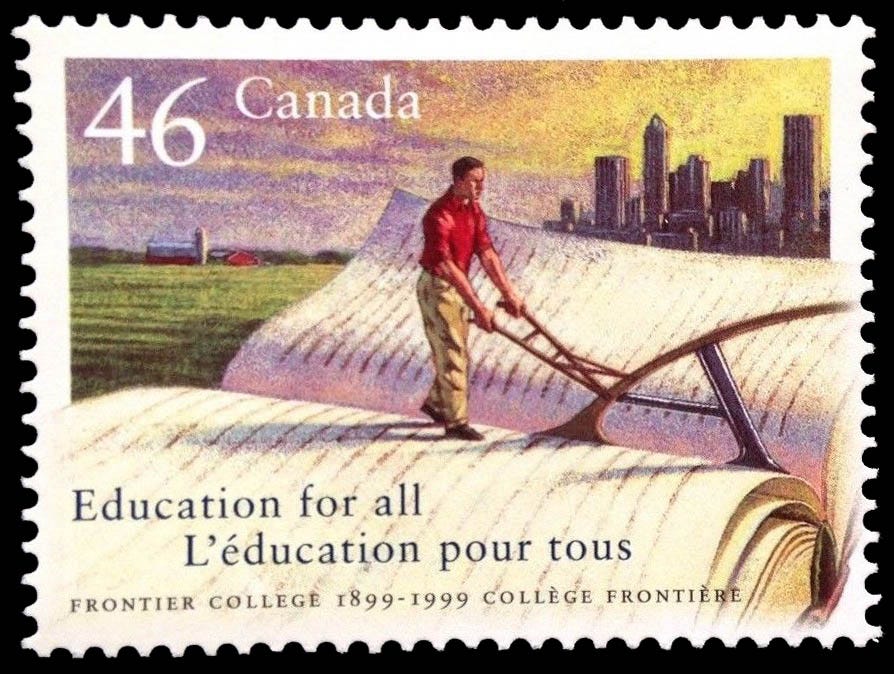Reading Camps for lumber, mining, and railway workers in Canada
"less swearing, gambling, ‘jumping’ and running to the saloons"

Reading Camps.
In 1900, the Ontario Department of Education and Alfred Fitzpatrick engaged in an experiment to supply books to reading camps for lumber, mining, and railway workers in Northern Ontario.1 The center-periphery interplay between education officials and Fitzpatrick gave birth to two important adult education agencies: Frontier College and Ontario’s travelling library system. Although the Department partially accepted Fitzpatrick’s original plan for library extension, he garnered enough public support and employer endorsements to leverage government action on key issues related to a systematic book supply, the reduction of illiteracy, and non-formal adult learning techniques. 2
The experiment was a success as reported:
I am surprised to find that a building 20 x 30 feet is filled every evening, and all day Sundays. There is less swearing, gambling, ‘jumping’ and running to the saloons.
Frontier College
Founded in 1899, Frontier College is Canada’s longest-standing literacy organization and the labourer-teacher program is its original program. The founder of Frontier College, Alfred Fitzpatrick, a Presbyterian minister from Pictou, Nova Scotia, envisioned a world where an education was available to not only the wealthy, urban middle class, but also to isolated frontier camp labourers working in Canada’s mines, lumber camps and railway camps.3
The goal of the original labourer-teacher program, in the early days known as “The Reading Camp Association,” was “The Education and Social Emancipation of the Semi-Nomadic Labourers in the Frontier Lumbering, Mining, and Railway Construction Camps of Canada.” 4 In 1903, with 24 reading rooms already in operation, Frontier College suddenly took on a more active role in adult education. Teacher Angus Gray grew restless waiting for men to drop in at the end of the day. Joining them in their work, he initiated the concept of the labourer-teacher.
Gray was a librarian-instuctor at Hall's Lumber Camp in northern Ontario. After several months, he decided that attendance at his classes would increase if he laboured during the day with the men in his camp in addition to teaching them at night. Not only would this eliminate Grey's redundancy at the camp during the day while the men were at work, it would also make him a more effective teacher. It would allow him to understand better the lives and interests of the men who worked in the camp, which would make his classes more relevant to his students' needs.5
On the eve of the First World War, 79 instructors were serving in eight provinces, and in 1919 the Reading Camp Association took on the name Frontier College.
Frontier College celebrated its 100th anniversary in 1999. A stamp was issued in its honor.6 Today it is called United for Literacy. Here is a timeline of Frontier College’s development: United for Literacy - Important Moments in History.
“Travelling Libraries for Lumber Camps,” Canada Lumberman 21, 11 (Nov. 1900): 9.
Bruce, Lorne D., (Sep 24, 2014). "Reading Camps and Travelling Libraries in New Ontario, 1900–1905." Historical Studies in Education / Revue d’histoire de l’éducation.
Perry, Joseph Adam. “Beyond the Bunkhouse: Exploring the Learning of Frontier College Labourer-Teachers.” ProQuest Dissertations Publishing, 2008.
Morrison, J.H. (1989). Camps and classrooms: A pictorial history of Frontier College. Toronto: Frontier College Press. Morrison, J.H. (1999a); George Cook, “Educational Justice for the Campmen: Alfred Fitzpatrick and the Foundation of Frontier College, 1899–1922,” in Michael Welton, ed., Knowledge for the People: The Struggle for Adult Learning in English Speaking Canada, 1828–1973 (Toronto: OISE Press, 1987), 35-51.
ACTION AND ADVOCACY: ALFRED FITZPATRICK AND THE EARLY HISTORY OF FRONTIER COLLEGE by Erica Martin. A thesis submitted in conformity with the requirements for the degree of Master of Arts Department of Adult Education, Cornrnunity Development and Counselling Psychology Ontano Institute for Studies in Education of the University of Toronto. MQ53317.pdf (utoronto.ca)
Founded in 1899 as the Canadian Reading Camp Movement, Frontier College brought education to thousands of labourers in remote northern logging, mining and railway camps. Today, while educating migrant farm workers strengthens its country roots, Frontier College has also evolved into a powerful urban force for literacy. Canada Post, another strong supporter of literacy in Canada, joins in celebrating the 100th anniversary of this historic institution with the release of an evocative new domestic-rate stamp.






Another really cool story. I've spent 35 years working off and on at mine camps. There was always a lot of book trading going on. Thank you, Kathleen!
This is all just fascinating. I especially love the teacher who worked alongside his students so that he could understand and teach them better. What insight he had!